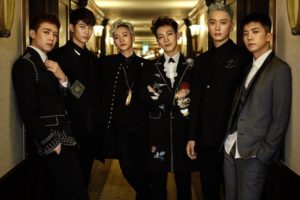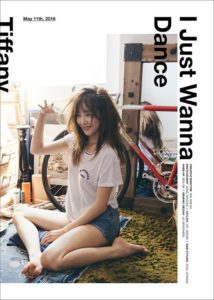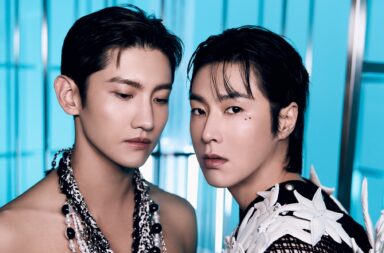 2016 was an eventful year in K-pop. We’ve covered plenty in our various End-of-Year reviews (Comebacks, Mini Album, Album, Choreography, Drama, MV, Debut, Indie) and we’ve talked about our K-pop resolutions for 2017. In 2016, Seoulbeats published a multitude of articles that covered a vast array of topics and themes – from music video and album reviews, to various socio-cultural pieces, and more.
2016 was an eventful year in K-pop. We’ve covered plenty in our various End-of-Year reviews (Comebacks, Mini Album, Album, Choreography, Drama, MV, Debut, Indie) and we’ve talked about our K-pop resolutions for 2017. In 2016, Seoulbeats published a multitude of articles that covered a vast array of topics and themes – from music video and album reviews, to various socio-cultural pieces, and more.
This week, we ask our writers: what were your favorite 2016 Seoulbeats articles? What is it about these articles that stood out for you?
Dawn: My favourite article for 2016 is, hands down, “Boy Meets Art: BTS‘s “Blood, Sweat & Tears” as Kunstlerroman.” I thought it was a very all-rounded article that put together various bits and pieces of information (from teasers, individual singles etc.) to formulate a really coherent and comprehensive reading of the music video. It also highlighted and interpreted a lot of literary and artistic references that contributed heavily to my overall understanding of the whole video. And especially with BTS and their tendency to drop millions of references, putting all this together was really no small feat! I couldn’t have written anything like that, even if I tried!
Another article that I really enjoyed in 2016 was “Counterpoint: “Decalcomanie” Reveals Broader Passivity of Female Desire.” While I agree with most that the insinuations of dating violence and sexual assault in the video is not okay at all, I think the article’s reading of the music video offered a very plausible alternative. The tension and contradiction between the video and the lyrics is something that is very common in K-pop, and as the article points out, is a delicate balance that the directors and producers failed to handle with sufficient finesse. This article really brought to light the finer, more nuanced bits of the music video that might have been buried under the onslaught of (mostly righteous and justified) anger informed by a more general reading of the video.
 Qing: Thank you, Dawn. That BTS piece must’ve taken me at least 30 hours to research and write. It was grueling, but it was a very rewarding learning experience. On the note of learning, the articles I’ve picked are more the ones that stand out for what they taught me, rather than my favorites.
Qing: Thank you, Dawn. That BTS piece must’ve taken me at least 30 hours to research and write. It was grueling, but it was a very rewarding learning experience. On the note of learning, the articles I’ve picked are more the ones that stand out for what they taught me, rather than my favorites.
One reason why I stuck around as a Seoulbeats reader was that, although I didn’t always agree with the writers’ viewpoints and assessments, the articles often made me revisit works that I’d set aside after the first watch or listen. One such article was the review of 2PM‘s Gentlemen’s Game. If it weren’t for that review, I would never have gone back to listen to the album again, or have been able to appreciate its value and 2PM’s musical growth in how they took 1990s pop and R&B influences, but made these into something of their own.
“Seolhyun and Zico, or 5 Reasons to Hate the Paparazzi” comes to mind for a different reason, namely its rhetoric. Using a current piece of news as a springboard, Mark tackled the broader issue of paparazzi ethics. But he also supported a clearly written, incisive socio-cultural commentary with an attention-grabbing opening that places the reader in a reimagining of what occurred shortly before the shots of Seolhyun were snapped. The value of this introduction does not lie purely in its dramatic effect, but in how appropriate figures of speech—the hunting metaphor—were wielded to evoke emotions that factual prose could not have achieved in the same way. These drove home the arguments on the ethically suspect nature of the Korean paparazzi that thread through the rest of the piece.
 The final article is the feature on Nayeon‘s SoundCloud streaming mishap. As international fans and writers, we often view and comment on issues from an external perspective. This isn’t to say that the thoughts emerging from such a perspective are then wrong or biased, but rather that it is just as important to try to delve into the context before we bring in our perspectives. This article was an important reminder to me, as a newbie writer with Seoulbeats, to first understand before I analyze, evaluate, or critique. That’s a modus operandi I still stay true to, and hope to uphold for as long as I continue writing, regardless of what sphere I write in.
The final article is the feature on Nayeon‘s SoundCloud streaming mishap. As international fans and writers, we often view and comment on issues from an external perspective. This isn’t to say that the thoughts emerging from such a perspective are then wrong or biased, but rather that it is just as important to try to delve into the context before we bring in our perspectives. This article was an important reminder to me, as a newbie writer with Seoulbeats, to first understand before I analyze, evaluate, or critique. That’s a modus operandi I still stay true to, and hope to uphold for as long as I continue writing, regardless of what sphere I write in.
Mark: Thanks, Qing. I really enjoyed reading your breakdown of the “Decalcomanie” MV. I thought the conversation between that post and Angela’s counterpoint was really constructive and it’s the type of positive dialogue that we want to model when it comes to hot-button topics. Furthermore, your analysis of Sistar‘s “One More Day” MV was very enlightening and really brought to my attention how depicting a LGBTQ couple onscreen without objectifying or ridiculing them is such an important stepping stone in countering heteronormativity. Between these two pieces and the BTS one, I say that Qing has a true knack for diving waist-deep into a MV review.
Like the Nayeon Soundcloud post, Pat also took advantage of a controversial topic and allowed it to segue into a much deeper conversation on Korean-Japanese relations in “Tiffany and the Rising Sun: A Glance at South Korea-Japan Relations.” Take a gander at that one if you’d like a refresher on 20th century inter-regional conflicts and politics of East Asian nations. I just like how in order to truly contextualize a netizen shouting match, we must dive into 100 years of contemporary history.
 I really enjoyed our in-depth coverage of controversial issues from Park Yoochun‘s rape scandal, Hallyu’s banishment from China, and SNL Korea‘s sexual assault controversy. Of course the year wouldn’t be complete without coverage on cultural insensitivity. Angela showed us why it’s dangerous to fetishize an entire race or to perceive ethnicity as a form of musical inspiration. Gaya poked fun at K-pop’s attempts at turning the cultures of Jamaica, South Asia, and Africa into concepts or musical features. No matter the controversy, there’s always a deeper discussion to be had and I’m glad that those conversations took place.
I really enjoyed our in-depth coverage of controversial issues from Park Yoochun‘s rape scandal, Hallyu’s banishment from China, and SNL Korea‘s sexual assault controversy. Of course the year wouldn’t be complete without coverage on cultural insensitivity. Angela showed us why it’s dangerous to fetishize an entire race or to perceive ethnicity as a form of musical inspiration. Gaya poked fun at K-pop’s attempts at turning the cultures of Jamaica, South Asia, and Africa into concepts or musical features. No matter the controversy, there’s always a deeper discussion to be had and I’m glad that those conversations took place.
I also like to mention Lo’s MV review of Fiestar‘s “Apple Pie” and Marisa’s piece on Fall Fashions for their creativity and attention to detail. I have no words to describe how blown away I was when I read them. You’ll have to read them for yourself!
Pat: Thank you, Mark! It’s always a pleasure to use my degree for K-pop.
I second the mention of Qing’s “Boy Meets Art: BTS’s “Blood, Sweat & Tears” as Kunstlerroman” article. While I am nowhere near a BTS fan, the article made me appreciate the music video more, and it brought a different perspective and watching experience the second time around. Another MV review that I enjoyed was Mark’s review of BgA‘s epic debut with “Dong Saya Dae,” no reasons needed. My special mention is Camiele’s album review of Dean‘s 130 Mood: TRBL for introducing me to Dean and his vocals.
I love watching reality-variety shows, and one of my favorite experiences – not just as a participant, but as a reader – was the Produce 101 Support Group series. We may have never finished it, but participating in them made the experience better.
 Finally, I don’t watch K-drama’s often and in 2016, I only watched one drama. That was thanks to Sonya’s review of Page Turner, so I have to mention it!
Finally, I don’t watch K-drama’s often and in 2016, I only watched one drama. That was thanks to Sonya’s review of Page Turner, so I have to mention it!
Chelsea: 2016 really was a crazy year! I’m glad we managed to cover most of it and come out unscathed. Some of my favorite articles from 2016 tackled sex and gender issues in K-pop like the guest piece “The Many Manifestations of Misogyny in Hallyu,” and Pat’s “Sponsorships: Just Another Word for Prostitution?“ There are a lot of inequalities that exist in K-pop, as well as a seedy underbelly we often pretend doesn’t exist, so it was nice to see the darker aspects of K-pop revealed. Madi also tackled the sasaeng issue pretty bluntly in “When Oppa Doesn’t Want to Notice You: Idols vs Sasaengs,” and I appreciated that kind of straight forward honesty.
In addition to my favorite socio-cultural pieces, there were also some great album and MV reviews in 2016. I love a review that makes me appreciate a release all the more, and that was especially the case with Camiele’s review of Jonghyun‘s She Is. Cjontai’s take on B.A.P.‘s Noir also inspired me to give the album a chance, when I really hadn’t considered even listening before. There were so many album reviews this year, but those two really stood out.
In some cases, social issued collided with music reviews and — in a year as turbulent as 2016 — those articles were definitely stand-outs for the way they dissected the combination of art and social commentary. Like Mark already mentioned, Sistar‘s “One More Day” review was an enjoyable and poignant read. I was also fond of Qing’s take on Red Velvet‘s “One of These Nights” as an elegy for the Sewol Tragedy. While it’s not necessarily in line with my personal take on the MV, it did make me think a bit more about the release.
Do you have a favorite article?
(Images via SM Entertainment, Big Hit Entertainment, JYP Entertainment, RBW)


